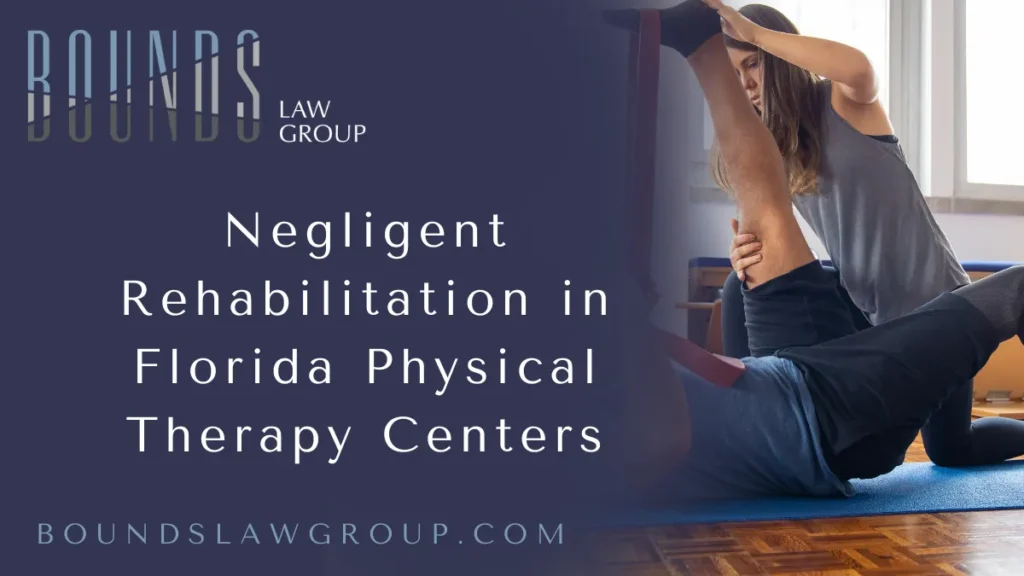
When patients seek treatment at Florida physical therapy centers, they place their trust in licensed professionals to provide safe, effective rehabilitation. Unfortunately, this trust can be violated through negligence or malpractice, leading to serious injuries and lifelong consequences. At Bounds Law Group, we specialize in representing victims harmed by negligent physical therapy. If you or a loved one has suffered due to substandard care, a Florida physical therapy malpractice lawsuit can help you obtain the compensation you deserve.
Contact us today through our free case evaluation form or call 877-644-5122.
Florida Physical Therapy Malpractice Lawsuit
A Florida physical therapy malpractice lawsuit arises when a licensed physical therapist fails to meet the accepted standard of care, causing injury or worsening a patient’s condition. To succeed in such a lawsuit, you must prove:
- A therapist-patient relationship existed
- The therapist breached the standard of care
- The breach directly caused your injury
- The injury resulted in damages, such as medical bills, pain, or lost wages
Our attorneys at Bounds Law Group conduct meticulous investigations and collaborate with medical experts to build strong cases tailored to each client’s unique circumstances.
Common Forms of Negligence in Florida Physical Therapy Centers
Negligence in rehabilitation can manifest in numerous ways. These common types of malpractice frequently serve as the foundation for Florida physical therapy malpractice lawsuits:
Inadequate Patient Evaluation
Failing to properly assess a patient’s medical history, current injuries, and physical limitations can lead to inappropriate treatment plans. This oversight often causes re-injury or aggravation of existing conditions.
Improper or Excessive Treatment
Physical therapy must be customized to the patient’s needs. Overly aggressive exercises, excessive force, or unsuitable techniques may cause torn ligaments, nerve damage, or chronic pain.
Lack of Proper Supervision
Injuries often occur when patients are left unattended during therapy exercises or while using equipment. Failure to supervise patients increases the risk of falls and other accidents.
Faulty or Poorly Maintained Equipment
Equipment malfunction or lack of maintenance can directly cause injury. Clinics that neglect upkeep may be held liable for resulting damages.

The Role of Informed Consent in Physical Therapy Malpractice
An essential but often overlooked factor in malpractice claims is whether the patient gave informed consent before treatment. Physical therapists must clearly explain the treatment procedures, potential risks, and alternatives. Without properly obtaining informed consent, any resulting injury may strengthen a Florida physical therapy malpractice lawsuit.
At Bounds Law Group, we examine consent forms and communications to verify that patients were fully informed. When consent is absent or inadequate, we use this to establish negligence and hold providers accountable.
Injuries Caused by Negligent Rehabilitation
Injuries from physical therapy malpractice can be severe and long-lasting, including:
- Torn ligaments and tendons
- Herniated discs
- Bone fractures
- Nerve injuries
- Chronic pain and stiffness
- Permanent loss of mobility or function
Such injuries often require additional medical treatment and can diminish quality of life permanently.
Who Is Liable in a Florida Physical Therapy Malpractice Lawsuit?
Liability can extend beyond the individual therapist to include:
- The physical therapy clinic or rehabilitation center
- The hospital or healthcare system where therapy occurred
- The manufacturer of defective equipment, if relevant
Our legal team ensures all responsible parties are identified and pursued for damages.
Damages Recoverable in a Florida Physical Therapy Malpractice Lawsuit
Victims can recover compensation for:
- Medical expenses (past and future)
- Lost wages and reduced earning capacity
- Pain and suffering
- Emotional distress
- Loss of enjoyment of life
- Costs of ongoing care and assistive devices
We work with financial and medical experts to calculate comprehensive damages that reflect the full impact of your injuries.
Statute of Limitations: Act Quickly to Protect Your Rights
Florida law imposes a strict two-year statute of limitations to file a malpractice claim, starting from when the injury was discovered or reasonably should have been discovered. There is also an absolute four-year deadline from the date of the negligent act. Missing these deadlines can bar your ability to recover compensation, making swift legal action essential.

How Bounds Law Group Builds Your Case
We employ a thorough approach to every case by:
- Obtaining and analyzing all medical and therapy records
- Consulting independent medical experts
- Interviewing witnesses and facility staff
- Reviewing safety protocols and equipment maintenance records
- Calculating damages with expert assistance
Our dedicated team handles all legal complexities while you focus on healing.
What To Do If You Suspect Negligent Rehabilitation
If you suspect you’ve been harmed by physical therapy malpractice:
- Seek immediate medical evaluation and document all injuries
- Request copies of your medical and therapy records
- Avoid signing any documents or settlement offers without legal advice
- Contact Bounds Law Group for a comprehensive case review
Our experienced attorneys will guide you through your legal options and fight to hold negligent parties accountable.
Contact Bounds Law Group for a Free Case Evaluation
If you or a loved one suffered due to negligent rehabilitation, don’t delay. Complete our free case evaluation form or call us now at 877-644-5122 to speak with an experienced attorney. We work on a contingency basis—no fees unless we win your case.
Sources
- Florida Statutes on Medical Malpractice – Comprehensive legal framework governing malpractice claims in Florida.
- American Physical Therapy Association (APTA) – Standards and ethical guidelines for physical therapy professionals nationwide.
- National Institutes of Health - Physical Therapy Risks – Research on potential complications and adverse events in physical therapy.

